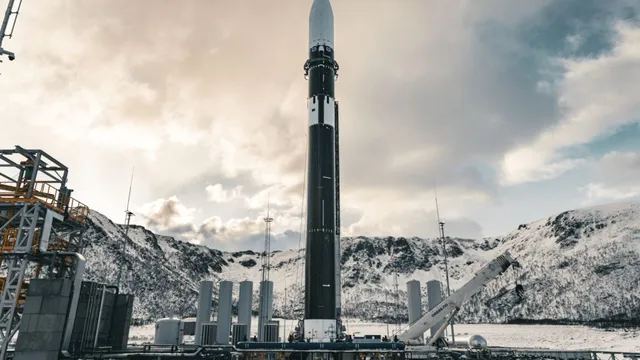
Isar Aerospace prepares to launch its first rocket in a crucial test
2025-03-24 09:23- Isar Aerospace is set to launch its first Spectrum rocket from Andøya Spaceport in Norway.
- The launch window is scheduled for March 24, 2025, subject to weather and safety conditions.
- Isar's goal is to collect data and experiences to enhance future launches and compete in the European market.
Express your sentiment!
Insights
In Norway, a private European aerospace company, Isar Aerospace, is poised to make its inaugural test flight of the Spectrum rocket. The launch from Andøya Spaceport is scheduled for March 24, 2025, within a timeframe of 12:30 p.m. to 3:30 p.m. local time, contingent upon weather and safety conditions. This event is significant as it marks Germany's return to developing a homegrown liquid-fueled rocket 80 years after the last V-2 launch during World War II. Isar has stated that a successful outcome for this initial flight would be gaining valuable data and experience, rather than necessarily reaching orbit. The Spectrum, measuring 28 meters in height, is a two-stage launch vehicle specifically designed to accommodate small and medium-sized satellites. Despite its position as a competitor to established players like SpaceX and Arianespace, Isar Aerospace anticipates that it may not attain orbital status in this first attempt; a duration of just 30 seconds in the air can be deemed a success. The overarching goal of this test flight is to advance the technological capabilities in the European space launch market. In light of current geopolitical climates, Daniel Metzler, co-founder and CEO of Isar Aerospace, emphasized that the significance of the test flight transcends the technology alone—it serves as a critical platform for enhancing security, resilience, and technological progress within Europe. Historically, European countries have called upon SpaceX for satellite launches amidst delays faced by their homegrown solutions, most notably with Arianespace's Ariane 6 and Vega rockets. As a part of a larger strategy, Isar aims to produce up to 40 launch vehicles annually at a planned facility near Munich. This ambitious production goal is reflective of an evolving landscape within the European launch market, where private companies are gradually stepping up to challenge long-standing government-sanctioned launch programs. A pivotal point will soon arrive as the European Space Agency prepares to make announcements regarding the allocation of contracts to various launch startups, thus solidifying the competitive environment that Isar Aerospace seeks to contribute to.
Contexts
The European private space companies market competition has experienced a dynamic evolution, particularly in the last decade, driven by advances in technology and a growing emphasis on global partnerships. European companies are increasingly competing not only among themselves but also with well-established players in the space industry like SpaceX and Blue Origin. This competition encourages innovation and efficiency, as firms strive to capture a share of the burgeoning market for satellite launches, space tourism, and related services. Key players such as Arianespace, Rocket Factory Augsburg, and Isar Aerospace are establishing themselves through strong governmental support, collaborative projects, and an emphasis on sustainability, which aligns with broader European goals on climate change and responsible exploration of space resources. Significant factors influencing competition in the European private space sector include the ongoing advancements in launch vehicle technology, miniaturization of satellites, and the declining costs associated with launches. The rise of small satellite constellations opens new market segments, prompting European firms to develop dedicated solutions for this evolving demand. For instance, enhanced launch vehicles that accommodate small payloads have been designed to be cost-effective and highly adaptable, allowing for more frequent launch schedules. Furthermore, the European Union’s investment in various space initiatives, such as the European Space Agency's (ESA) partnerships and funding for innovative projects, has played a crucial role in igniting competition and fostering an environment conducive to growth. The landscape is further enriched by a growing network of startups and smaller companies that push the boundaries of research and development. These enterprises are often backed by venture capital, which intensifies competition as they introduce new technologies and concepts to the market. Additionally, partnerships between established aerospace companies and new entrants have become more common. These strategic alliances enable knowledge-sharing and resource pooling, allowing partners to enhance their competitive edge. Collaborative efforts are often seen in satellite design, manufacturing, and launch services, where firms can offer more comprehensive solutions and improve service offerings to clients. As the market progresses, it is evident that government policies and international regulations will significantly shape the competitive landscape. The European Union’s commitment to creating a unified space market is crucial, as it facilitates the seamless operation of private space companies across borders while addressing regulatory hurdles. As competition intensifies, European private space companies will need to continuously innovate while remaining adaptable to the changing dynamics of the global landscape. The ongoing investments, technological advancements, and collaborative efforts will ultimately determine the success and sustainability of competition within Europe’s private space sector, ensuring that it remains a vibrant and prominent player in the global space industry.